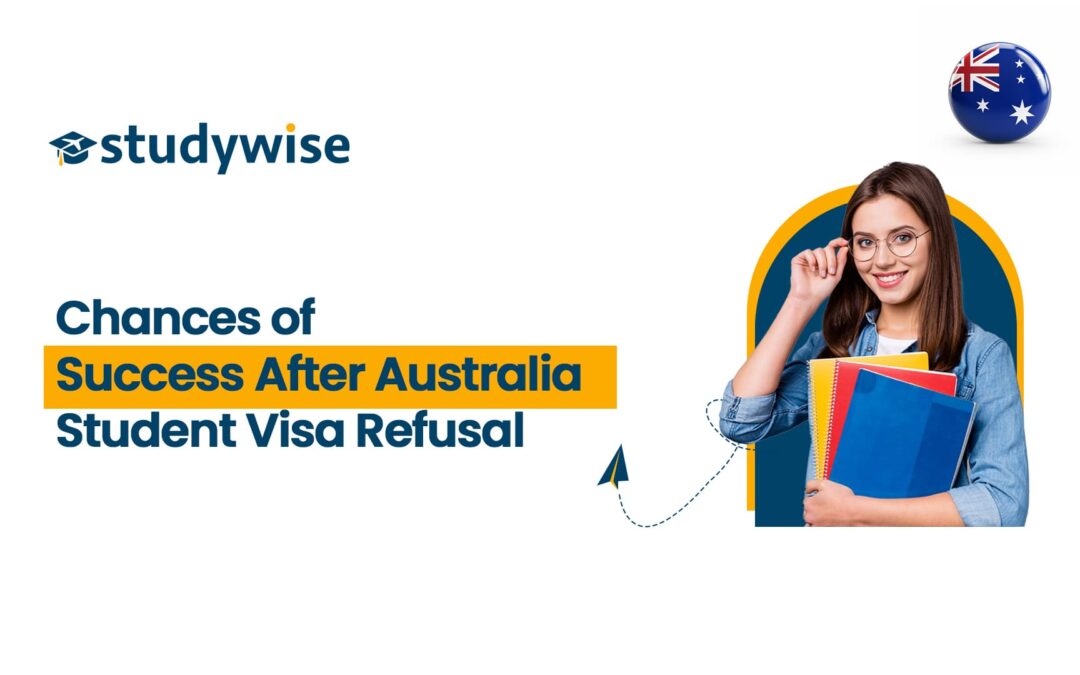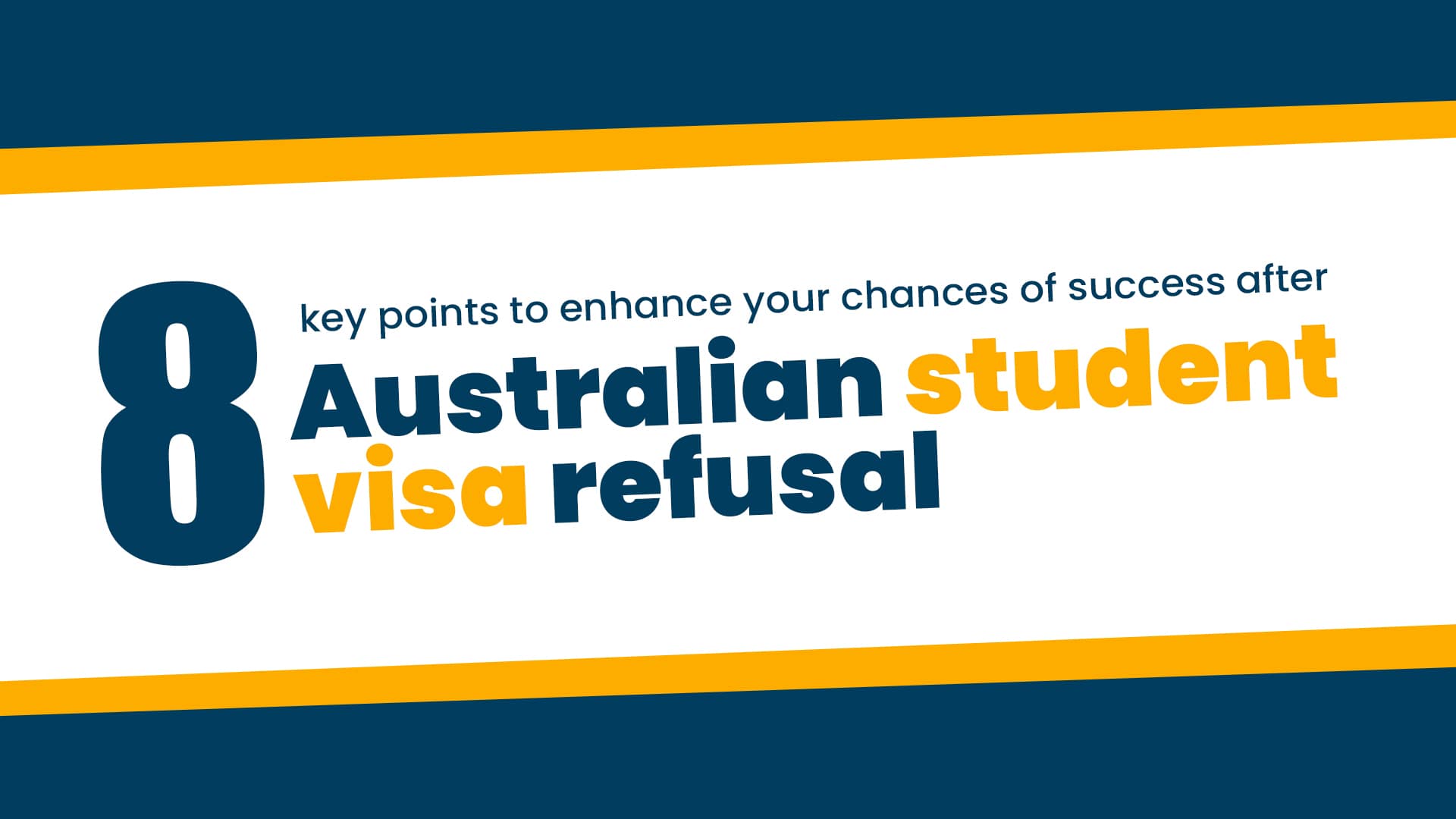Hello, Future Aussie Scholar! So, your visa dreams took an unexpected detour? Don’t let the letter of an Australia student visa refusal be the end of your Aussie adventure. We get it; it’s a bit disappointing, but chin up, as your student visa journey is far from over.
You’re not just a student visa applicant; you’re a resilient future graduate, and setbacks are just pit stops on your road to success. The good news is that you can hit the restart button and apply again.
However, it is normal to feel a bit lost. Fret not. We’re your Aussie visa lifeline. We understand your frustration and can help transform your disappointment into determination. We’re your dedicated guides on this visa-processing journey, and together, we can surely turn the tables in your favor.
Just imagine you are back on track and enjoying Australian campus life. Sounds good? Excellent!
Now, let’s understand the cause of rejection, find the solution, and craft an application that says, “Aussie universities, here I come!” Read ahead to find an effective answer, and let’s make your comeback stronger than a kangaroo’s jump.
Does A Visa Refusal Or Cancellation Affect Future Visa Applications?
If your visa application gets rejected or your visa is canceled, it will surely affect your future attempts to secure a visa. Remember, you’ll need to openly share these incidents in all your upcoming visa applications and related forms. Keeping a positive immigration record is key to a successful application. A clean history without visa refusals and adherence to visa conditions significantly influence the decision-making process for visa approvals.
Now, let’s talk about what happens if your visa is canceled, can you apply for another visa to Australia after a cancellation? Is it possible to try for an Australian visa after a previous refusal?
Let’s explore the answers to these questions.
A Second Chance by Reapplying For a Student Visa
If your student visa for Australia has been denied, there are various possibilities for a second application. However, it’s crucial to address and honestly present the reasons for the initial refusal. If the refusal was due to genuine issues that can be rectified, you have a chance to reapply.
Before attempting a new application, it’s essential to understand that the success of your new application hinges on addressing the specific reasons for the initial rejection. On top of that, your chances can further improve when you provide significant evidence demonstrating that the issues leading to the refusal have been resolved.
Keep in mind that having a history of visa refusal can complicate the application process. Moreover, success relies heavily on the strength of the evidence and the quality of the documents you submit. Take the time to thoroughly address and fix the issues to enhance your chances of a successful second application.
Key Strategies to Apply For the Australia Student Visa After Refusal
For students in Australia facing a student visa refusal, the option to reapply is available after addressing and rectifying the issues. To avoid repeating the same mistake and to improve your chances of success, consider the following key strategies tailored to the reasons for the initial refusal when reapplying for a student visa:
1. Understand the Reasons
Examine the grounds for the initial rejection of your Australian student visa application with thorough consideration. If any aspect of your visa application is unclear or demands further explanation, make a concerted effort to seek clarification. It is crucial to analyze each and every reason behind the refusal to address any issues and increase the possibilities of a successful visa reapplication.
2. Learn from Mistakes
Always try to learn from your past mistakes. Acknowledge and understand the errors or shortcomings that led to the Australia student visa refusal. Demonstrate a proactive approach to addressing and rectifying these issues.
3. Seek Professional Guidance
For comprehensive guidance on your Australian student visa application, consulting with a professional ensures a thorough review of your application. That can certainly assist you in dealing with the potential pitfalls and will increase the likelihood of a successful outcome.
Their specialized knowledge can prove invaluable in addressing specific nuances and requirements, enhancing your overall application strategy. Choosing to work with a seasoned expert provides you with the confidence that your visa application is in capable hands, optimizing your chances for a smooth and successful process.
4. Gather Comprehensive Documentation
For a successful student visa application, it is important to compile a comprehensive set of documents that thoroughly address the specific concerns raised during the previous visa refusal.
Clearly present compelling evidence that effectively alleviates any doubts or issues that may have led to the previous denial. This documentation should be detailed and persuasive and showcase your genuine intent to study. Moreover, it should highlight any changes or additional information that may positively impact the visa decision. By attentively addressing the previous concerns, you can secure a favorable outcome for your student visa application.
5. Address Specific Concerns
To address the reasons for the previous Australian student visa refusal, work to rectify any issues and misunderstandings. Firstly, provide thorough documentation to substantiate your financial capacity, including bank statements and a sponsor’s affidavit. These will demonstrate your ability to cover tuition and living expenses in the Land Down Under.
Additionally, clarify any ambiguities in your previous visa application by submitting a detailed letter explaining the purpose and significance of your chosen course. In addition, demonstrate your career goals and emphasize the positive impact it will have on your academic and professional development.
Furthermore, address concerns related to your genuine temporary entrant status by highlighting your strong ties to your home country. This can include your family connections and a confirmed job offer upon completion of your studies. This approach, backed by solid evidence can enable you to overcome the prior issues and present a compelling case for approval.
6. Demonstrate Genuine Intentions
Clearly articulate your genuine intentions for studying in Australia. This can include, your sincere purpose for pursuing studies in Australia and your deep-seated desire to enhance your academic and professional growth in a globally recognized educational environment.
Make sure to ensure that you’re wholeheartedly committed to adhering to all visa conditions. Ensure that you’ll strictly comply with all the rules, and diligently complete your education. Your aim shouldn’t only acquire knowledge but also to contribute meaningfully to the academic community. On top of that, demonstrate that you’re dedicated to making the most of this opportunity. In the end, explain that you’ll utilize all the resources available and ultimately emerge as a well-rounded, globally competitive individual.
7. Improve Communication
Crafting a thoroughly organized and articulate student visa application is necessary. Clearly outline your plans, objectives, and how your chosen course directly aligns with your career goals. Providing detailed insights into your aspirations will strengthen your application and enhance its clarity and conciseness.
8. Submit a Complete Application
In order to prevent any errors in your application, it is vital to review every aspect and include all necessary forms and supporting documents. Make sure you carefully go through the application requirements and gather all the relevant materials to avoid any missing or incomplete information. This attention to detail will enhance the accuracy and completeness of your submission. As a result, it will increase your chances of a successful application process.
By incorporating these approaches, you not only have the chance to acquire the reasons for Australia student visa refusal from the initial application but also enhance the likelihood of a successful reapplication for an Australian student visa. Keep in mind that every application serves as a platform to demonstrate your dedication and suitability for pursuing studies in Australia.
In essence, if your visa has been rejected, you can view the refusal as an opportunity for learning and growth. As the saying goes, “Many times, what we perceive as an error or failure is actually a gift. And eventually, we find that lessons learned from that discouraging experience prove to be of great worth.” Richelle E. Goodrich.
How Can StudyWise Help You?
While applying again after the Australia student visa refusal, thoroughly address any concerns raised in the previous refusal and provide compelling evidence to counter the reasons for the initial denial.
So, hit the restart button and let your Australian dream unfold with even greater determination and resilience with our assistance. Your academic journey to the Land Down Under is just a reapplication away. So, why wait? Seize the opportunity by booking a consultation session with us today.
End Note
Facing rejection in your pursuit of an Australian student visa is undoubtedly disheartening, but it should not be the end of your academic aspirations Down Under. Embrace the refusal as an opportunity for growth and learning. Such setbacks are merely temporary stops on the road to success.
However, understanding the implications of a visa refusal is crucial, as it can impact not only your future attempts but also the applications of your family members. Maintaining a positive immigration record is key, and a clean history significantly influences visa approval decisions.
If you find yourself outside Australia with a visa denial, remember that you can reapply at any time. However, meticulous preparation is paramount, especially if you have a history of refusals. View the refusal not as a roadblock but as an opportunity to strengthen your application.
In the end, crafting a successful reapplication involves learning from past mistakes, seeking professional guidance, and addressing specific concerns raised during the previous refusal. In order to maximize your chances of success, clearly demonstrate your genuine intentions, improve communication, and submit a complete, well-organized application.
FAQs:
How can you improve your chances of a successful student visa application after a refusal?
You should incorporate insights gained from the initial rejection, consult with a experts for expert advice, tackle specific issues cited in the prior refusal, and provide compelling proof that showcases the resolution of those concerns. Thorough documentation, transparent communication, and sincere intentions are key elements for success.
If you are in Australia and your visa is rejected, do you need to leave Australia?
In some cases, applicants don’t have to leave the country and within 21 days from the day of Visa Application Rejection, they can appeal at MRT (Migration Review Tribunal) for a review of the Department of Home Affairs decision. Sometimes even if your visa gets refused, you will have a chance to apply for another visa. However, this is totally based on case-to-case and individual circumstances.





